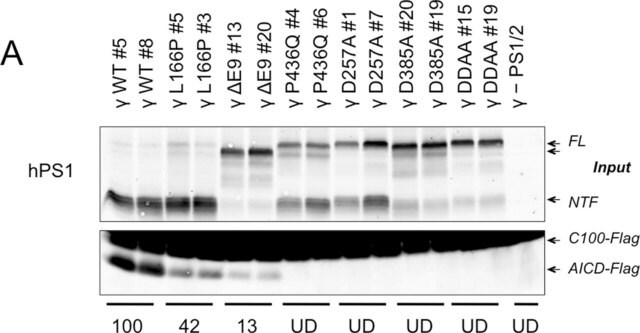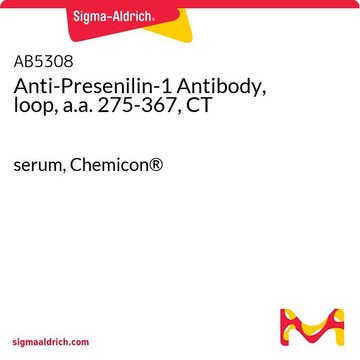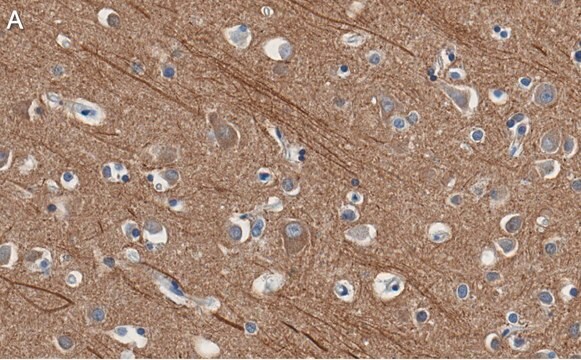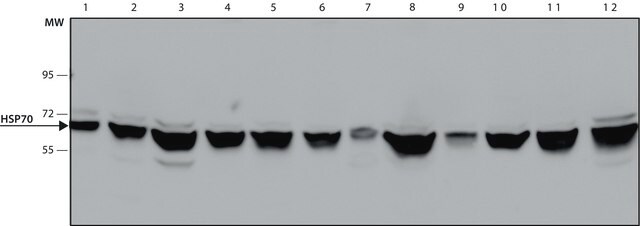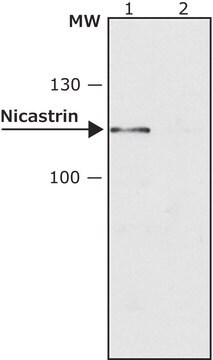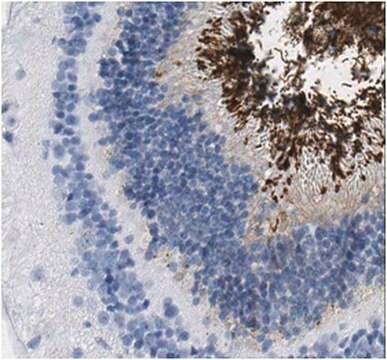ZMS1101
Anti-Presenilin-1 Antibody, clone PS1-loop ZooMAb® Mouse Monoclonal

recombinant, expressed in HEK 293 cells
Sinónimos:
PS-1, Protein S182
About This Item
Productos recomendados
origen biológico
mouse
Nivel de calidad
recombinante
expressed in HEK 293 cells
conjugado
unconjugated
forma del anticuerpo
purified antibody
tipo de anticuerpo
primary antibodies
clon
PS1-loop, recombinant monoclonal
Línea del producto
ZooMAb® learn more
Formulario
lyophilized
mol peso
calculated mol wt 52.67 kDa
observed mol wt ~52 kDa
purificado por
using protein G
reactividad de especies
human, mouse
envase
antibody small pack of 25 μL
características de los productos alternativos más sostenibles
Waste Prevention
Designing Safer Chemicals
Design for Energy Efficiency
Learn more about the Principles of Green Chemistry.
validación mejorada
recombinant expression
Learn more about Antibody Enhanced Validation
sustainability
Greener Alternative Product
técnicas
ELISA: suitable
affinity binding assay: suitable
immunocytochemistry: suitable
western blot: suitable
isotipo
IgG1
secuencia del epítopo
C-terminal half
Nº de acceso Protein ID
Nº de acceso UniProt
categoría alternativa más sostenible
Condiciones de envío
ambient
temp. de almacenamiento
2-8°C
modificación del objetivo postraduccional
unmodified
Información sobre el gen
human ... PSEN1(5663)
Descripción general
Especificidad
Inmunógeno
Aplicación
Evaluated by Western Blotting in HeLa cell lysate.
Western Blotting Analysis: A 1:1,000 dilution of this antibody detected Presenilin-1 in HeLa cell lysate.
Tested applications
Western Blotting Analysis: A 1:1,000 dilution from a representative lot detected Presenilin-1 in lysates from A431 and NIH3T3 cells and Mouse brain tissue.
Affinity Binding Assay: A representative lot of this antibody bound recombinant Human Presenilin-1 fragment with a KD of 1.6 x 10-7 in an affinity binding assay.
Enzyme Immunoassay Analysis (ELISA): A representative lot of this antibody detected recombinant Human Presenilin-1 fragment in ELISA application.
Immunocytochemistry Analysis: A 1:100 dilution from a representative lot detected Presenilin-1 in A431 cells.
Note: Actual optimal working dilutions must be determined by end user as specimens, and experimental conditions may vary with the end user
Evaluated by Western Blotting in HeLa cell lysate.
Western Blotting Analysis: A 1:1,000 dilution of this antibody detected Presenilin-1 in HeLa cell lysate.
Descripción de destino
Ray, WJ., et al. (1999). J. Biol. Chem. 274(51); 36801-36807).
Forma física
Almacenamiento y estabilidad
Información legal
Cláusula de descargo de responsabilidad
¿No encuentra el producto adecuado?
Pruebe nuestro Herramienta de selección de productos.
Código de clase de almacenamiento
11 - Combustible Solids
Clase de riesgo para el agua (WGK)
WGK 1
Punto de inflamabilidad (°F)
Not applicable
Punto de inflamabilidad (°C)
Not applicable
Elija entre una de las versiones más recientes:
Certificados de análisis (COA)
¿No ve la versión correcta?
Si necesita una versión concreta, puede buscar un certificado específico por el número de lote.
¿Ya tiene este producto?
Encuentre la documentación para los productos que ha comprado recientemente en la Biblioteca de documentos.
Nuestro equipo de científicos tiene experiencia en todas las áreas de investigación: Ciencias de la vida, Ciencia de los materiales, Síntesis química, Cromatografía, Analítica y muchas otras.
Póngase en contacto con el Servicio técnico
